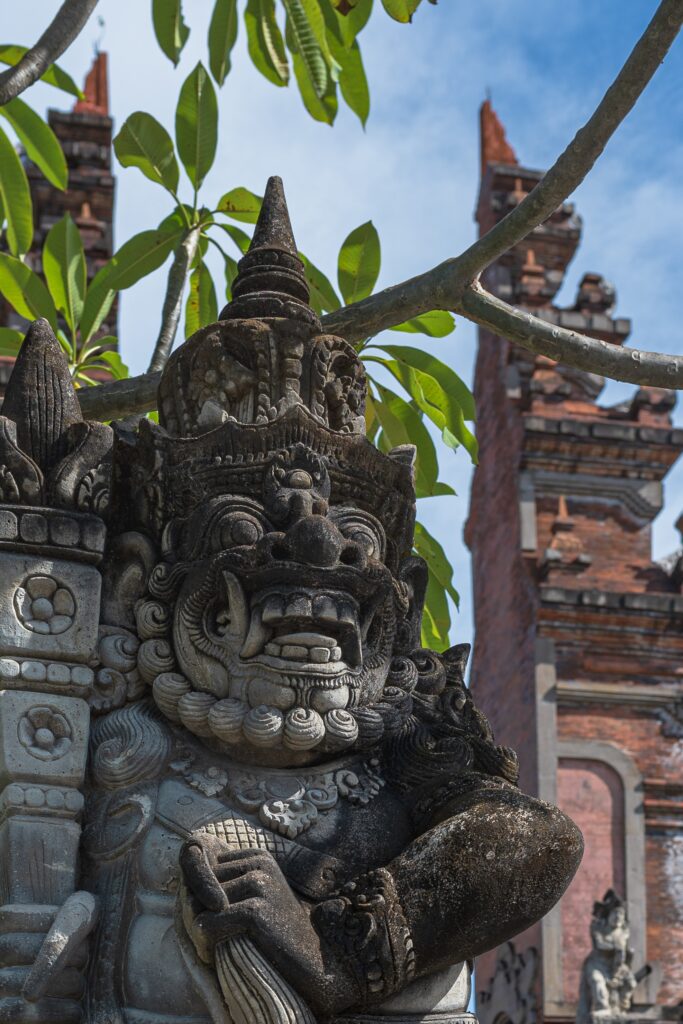Wondering if Indonesia is safe? Here are some tips and current events you may want to know to fully prepare for your trip to Indonesia and stay safe while you're there!

Indonesia is one of the most special places to visit in Southeast Asia.
Best known for its popular island of Bali, Indonesia lies in the Indian and Pacific Oceans and is made up of over 17,000 islands. With its idyllic beaches, stunning volcanoes, gleaming temples, delicious food, and welcoming locals, there are countless reasons to visit this beautiful and vibrant archipelago. However, the question remains: is Indonesia safe?
Like any country, Indonesia has its strengths and weaknesses. Overall, it can be considered a travel destination safe. However, there are precautions any traveler should take, and having the right knowledge is essential to staying safe throughout your trip.
If you do some research and are aware of the restrictions on travel and safety precautions in Indonesia, you can have an amazing trip there! You can also consider a work exchange with Worldpackers to learn about local culture and stay safe.
Whether you're visiting the tourist haven of Bali or venturing to a lesser-known island like Lombok, Sumatra, Komodo, or Flores, just travel smart and you'll be able to enjoy all the beauty of this fascinating country. Southeast Asia!
Is Indonesia safe to travel to?
While Indonesia is generally safe, there are some security risks you may want to be aware of.
But don't let the possibility of crime or natural disaster keep you from traveling! Bad things can happen anywhere in the world, and you shouldn't let fear paralyze you.
However, if you want to be a smart traveler, it can be helpful to simply be aware of your surroundings and be prepared. Here are some common safety risks known to occur in parts of Indonesia.

Crimes and Scams
Crime and scams are quite common in Indonesia, but you can avoid them if you're prepared and stay alert!
The most common type of crime in the country is petty crime, such as pickpocketing. Crowded tourist areas like Bali are rife with pickpockets. To avoid becoming a victim, make sure to lock your valuables in your accommodations and keep your bag close by while exploring.
ATM fraud and scams can also occur. Avoid these by using only official ATMs inside banks or commercial establishments. Exercise caution, hide your PIN number, and regularly monitor your bank account for any fraud.
Taxi scams can also happen, so always call an official taxi driver instead of grabbing a random one on the street.
Drinking substances can occur in tourist areas, especially if you are a woman. Never accept a drink from anyone! And if you are a solo traveler, avoid going out alone at night.
All of these crimes may seem scary, but again, they can happen anywhere and are easily prevented if you travel safely and use common sense.
Indonesia occasionally experiences violent crime. Armed robberies and kidnappings can occur, but mainly in certain areas. The provinces of Papua and Aceh, as well as East and West Kalimantan, are known to experience violent crime, so avoid these areas.
Natural Disasters and Health
Due to its location on several tectonic plates, Indonesia has a diverse island landscape that is prone to natural disasters.
Earthquakes, volcanic eruptions, tsunamis, and floods are known to occur on the islands. The problem with natural disasters is that people often don't know they're coming until it's too late!
Nature is unpredictable, and we can't always control it. But it's important not to let fear of natural disasters derail your trip. Always check local alerts to stay informed about potential risks. For example, travelers should currently avoid traveling to Mount Agung in Bali due to possible volcanic eruptions.
Health-wise, be sure to avoid drinking tap water in Indonesia. Pollution is a problem, so opt for bottled water. This means avoiding brushing your teeth and washing products with tap water, and avoiding adding ice to your drinks.
Also, make sure you're up to date on all your vaccinations and have medications for various tropical diseases that may occur. Talk to your doctor about the best options. health care that you may need to prepare for a trip to Indonesia!

Terrorism
Currently, one of the biggest risks in Indonesia is terrorism. Counterterrorism efforts are strong, but terrorist attacks have occurred in Indonesia and could still occur.
Terrorist attacks often target busy areas, including religious buildings, hotels, restaurants, bars, airports, public transportation, tourist attractions, and markets. Celebrations and holidays are sometimes used to launch such attacks.
To minimize the risk of terrorism, it's important to always be alert and aware of your surroundings while exploring. Identify exit routes in public places and follow local authorities' guidance. Also, monitor local news for signs of trouble.
Certain areas are more prone to terrorism and crime than others. Regions such as Central Papua, Papua Highlands, Central Sulawesi, and Maluku have experienced increased social tension and civil unrest. Avoid these areas during your travels as an extra precaution.
Tips for staying safe in Indonesia
Despite the issues we've mentioned, there are still ways to have a safe and successful trip to Indonesia. So, if you're still wondering, "Is it safe to travel to Indonesia?" It definitely is if you follow these steps and do your research!
Get travel insurance
Travel insurance is definitely essential when visiting Indonesia. You should definitely get travel insurance anywhere in the world, but definitely get it when visiting countries where theft, natural disasters, and tropical diseases are more common.
Travel insurance covers you if something happens abroad! Depending on the type of plan you purchase, you can have financial security if you need to pay medical bills, change flights, lose luggage, or any other type of problem.
Travel insurance can be expensive, but it will save you money in the long run. Just be sure to read your plan thoroughly and ask your insurance provider questions to understand exactly what you're covered for.

Make a Job Exchange
A work exchange is another great way to stay safe while traveling. This involves working in exchange for accommodation, allowing you to have a deeper cultural experience.
This type of travel saves money, but more importantly, it offers the opportunity to experience the local culture and way of life up close. You often live and work alongside locals, allowing you to truly get to know them and learn about their way of life.
Gaining local insights can give you extra knowledge that many tourists lack. You can make local friends, understand the region, and learn about the best things to do off the beaten path.
Your host wants you to have a great experience in their country, so they will help you find the safest areas and ensure you feel comfortable during your travels.

Other Travel Safety Tips
Besides experiencing a job exchange and having travel insurance, there are a few other habits you should adopt when traveling in Indonesia. Those wondering, 'Is Indonesia safe?' can confirm this. safety of your trip by practicing tips Smart travel tips. Most of these safety tips can be applied to any destination!
Avoid going out alone at night
This is a safety tip that applies to anyone, in any country. Exploring alone at night is never a good idea! Explore alone during the day or go out at night with a group. But venturing alone into a foreign environment after dark can put you at risk.
Especially for solo travelers For women, try to do all your outings during the day. If you want to go out at night for dinner or parties, make sure you're with a group of people you trust and who will take care of you!
Get the necessary vaccinations
When traveling to a country like Indonesia, visit your doctor before your trip to ensure you have the vaccinations and necessary medications. "Bali Belly" is a common term for food poisoning or stomach problems in Indonesia, so get some medicine that might help. And make sure you're vaccinated against diseases like yellow fever, dengue fever, malaria, and other harmful conditions.

Dress appropriately
Be sure to learn about and respect local cultures, traditions, and religions in any country. Much of Indonesia follows Islam, which has strict expectations regarding the clothing of men and women. Try to integrate by wearing similar clothing to the locals and showing respect for religious practices.
Do not wear flashy clothing or jewelry
While exploring, don't make yourself a target for pickpockets by wearing flashy jewelry! Even carrying an expensive phone or camera can attract pickpockets' attention. Keep valuables safely locked away in your accommodations. If you need a phone, camera, or debit card while sightseeing, keep it safely tucked away in your bag, where you can keep an eye or a hand on it at all times.
Make sure you follow local laws.
Indonesia has very strict laws regarding things like drugs and certain behaviors. Check local laws and make sure you comply. Punishments can be severe for misdemeanors, and it's smart to avoid trouble while traveling.
Research your destination in advance
No matter where you're traveling, good research can help keep you safe and prepared! All the safety tips and precautions mentioned in this article will help you have a smooth trip.
Following local warnings, being prepared for natural disasters, and knowing which areas to avoid will help you stay safe in Indonesia! Arriving in a country without information or knowledge can put you at risk, so it's always best to do your research.
With content from worldpackers.com
Lucas Wanderlust has a tireless spirit of adventure, always seeking new travel experiences. Fascinated by the world and the possibility of exploring unknown destinations, he fell in love with the sense of freedom and self-discovery that traveling alone provides. With a backpack on his back and a heart open to the unknown, Lucas embarks on exciting journeys, where each destination becomes a unique chapter in his life story. He gives himself body and soul to the magic of solo travel, inspiring others to follow in his footsteps and discover themselves through adventure.







